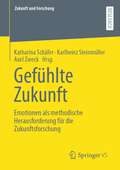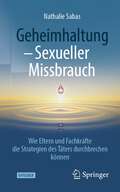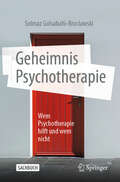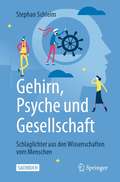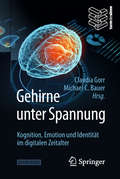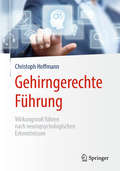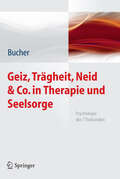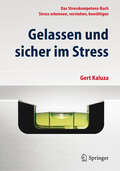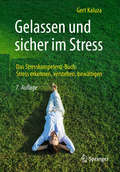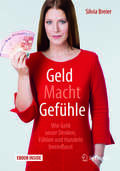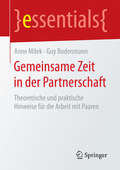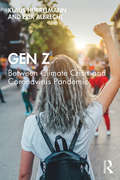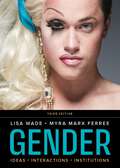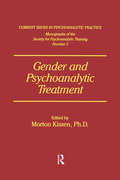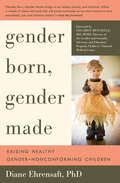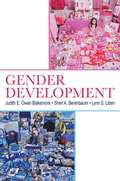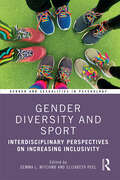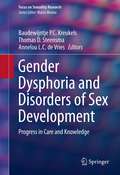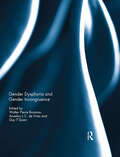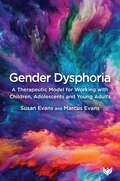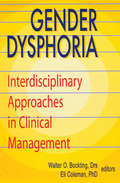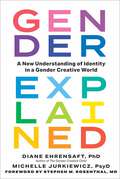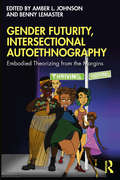- Table View
- List View
Gefühlte Zukunft: Emotionen als methodische Herausforderung für die Zukunftsforschung (Zukunft und Forschung)
by Axel Zweck Karlheinz Steinmüller Katharina SchäferWelche Rolle spielen Emotionen bei der Konstruktion, Kommunikation und Nutzung von Zukunftsbildern? Sind Emotionen primär eine Komponente, die Vorurteile transportiert? In welchem Maße sind Forschende selbst Emotionen ausgesetzt, die die Methodenwahl und die Ergebnisse beeinflussen? In dem Sammelband kommt die gesamte Breite der Thematik „Zukunftsforschung und Emotionalität“ zur Sprache, von den philosophischen Grundlagen bis zu methodischen Fragestellungen und Erkenntnissen aus der Praxis, die die enge Verschränkung von Kognition und Emotion in allen Phasen von Vorausschauprozessen belegen.
Geheimhaltung - Sexueller Missbrauch: Wie Eltern und Fachkräfte die Strategien des Täters durchbrechen können
by Nathalie SabasKinder und Jugendliche, die nach sexuellem Missbrauch durch Verhaltensauffälligkeiten auf sich aufmerksam machen, benötigen die Hilfe aller Professionen, um über das zu sprechen, worüber sie nicht sprechen wollen, können, dürfen oder sollen. Dem gegenübergestellt fühlen sich Fachkräfte immer wieder hilflos, wenn Kinder und Jugendliche ihnen von ihrem sexuellen Missbrauch berichten. Das Thema berührt den intimsten Bereich eines Menschen und verlangt daher ein hohes Maß an Sensibilität. Es wird ein dringender Appell an alle Professionen der Sozialen Arbeit, Sozialpädagogik, Erziehung, Schule, aber auch an Eltern gerichtet: Kindeswohl hat höchste Priorität. Vorschnelle Schritte können unter Umständen mehr schaden als nützen. Dieser Ratgeber greift genau an dieser Stelle ein und vermittelt dem Leser eine sorgfältige Herangehensweise, um ein Versagen auf allen Ebenen zu vermeiden - zum Wohle des Kindes. Der Schutz der systematisch Schwächsten, der Kinder, zählt zu den wichtigsten Aufgaben des Staates, aber auch den der Eltern. Die folgenden Fragen werden u.a. im Buch beantwortet:Was lässt sich zu den TäterInnen sagen? Wie interveniert das Wächteramt bei einem vagen Verdacht u.a. auch auf den Besitz von kinderpornografischem Material? Wie sieht eine gelingende Kooperation zwischen den Akteuren (insbes. Schulsozialarbeit / Wächteramt) aus? Wie kann institutionelles Versagen im Umgang mit sexueller Gewalt in der Jugendhilfe verhindert werden? Wie können Institutionen aber auch Eltern ihre Kinder vor sexuellem Missbrauch schützen?
Geheimnis Psychotherapie: Wem Psychotherapie hilft und wem nicht
by Solmaz Golsabahi-BroclawskiDas ist Psychotherapie: Zwei Menschen kommunizieren über Gefühle, Gedanken, Gedankenwelten und suchen nach Antworten. Die beiden sind sich fremd, sollen sich binnen weniger Stunden vertrauen und eine Beziehung aufbauen und mehr noch - Sie sollen Lösungen für langjährig bestehende Sackgassen im Leben finden! Die Häufigkeit psychischer Erkrankungen steigt weltweit. Menschen suchen Hilfe bei Psychiatern oder Psychotherapeuten - doch so groß der Bedarf, so groß auch das Misstrauen in allen Ländern, Kulturen, innerhalb der Gemeinden und Geschlechter gegenüber Psychotherapie: Sind die Psychiater und Psychotherapeuten tatsächlich die „Chirurgen der Seele&“? Können sie wirklich etwas bewirken, und wie funktioniert das? Was geht da vor sich? Wie funktionieren die einzelnen Techniken? Was geht in den Patienten vor, in und während der Therapiezeit? Wie geht es dem Therapeuten in der Therapie? Wo sind die Grenzen der Psychotherapie und wo die Gefahren und Nebenwirkungen einer Therapie? In diesem Ratgeber finden Patienten, ihre Angehörigen und alle interessierten Leser die Antworten: Einfühlsam und kompetent informiert die Autorin auf Basis ihrer langjährigen therapeutischen Erfahrung aus der Arbeit mit Menschen vielfältiger Herkunft und Orientierung und lüftet das Geheimnis, was hinter den geschlossenen Türen in Einzel- und Gruppensitzungen in der Psychotherapie vor sich geht.
Gehirn und Kunst: Von der Ästhetik zur Therapeutik
by Bruno ColomboIn diesem Buch wird die Kunsttherapie, ein spezifisches Instrument zur Erhaltung der Gesundheit im Bereich der affektiven Entwicklung, der Rehabilitation, der Motorik und der kognitiven Funktionen, eingehend analysiert und diskutiert. Kunsttherapie basiert auf der Annahme, dass der Prozess des künstlerischen Schaffens – Musik, Tanz, Malerei – Emotionen auslöst und die Gehirnaktivität steigert. Sie wird eingesetzt, um das persönliche Wachstum zu fördern, bestimmte Gehirnbereiche oder Aktivitätsmuster zu unterstützen und die neuronale Vernetzung zu verbessern. Die Behandlung neurologischer Erkrankungen mit künstlerischen Strategien bietet uns eine einzigartige Möglichkeit, die strukturellen Netzwerke des Gehirns zu beeinflussen und die Fähigkeit des Gehirns zur Bildung neuer Verbindungen zu verbessern. Auf der Grundlage der Plastizität des Gehirns hat Kunsttherapie das Potenzial, unser Repertoire zur Behandlung neurologischer Erkrankungen zu erweitern. Neuronale Substrate sind die Grundlage komplexer Emotionen bei Kunsterfahrungen und gehen mit einer umfassenden Aktivierung kognitiver und motorischer Systeme einher. Dementsprechend vermag Kunsttherapie Verhalten, Kognition, Aufmerksamkeit und Bewegung zu modulieren. In diesem Zusammenhang kann die Kunsttherapie wirksame Instrumente zur Verbesserung des allgemeinen Wohlbefindens, der Lebensqualität und der Motivation im Zusammenhang mit neurologischen Erkrankungen bieten. Das Buch erörtert die Kunsttherapie als ein mögliches Verfahren zur Behandlung neurologischer Störungen und nähert sich dem Verhältnis zwischen humanistischen Disziplinen und der Neurologie aus einer ganzheitlichen Perspektive, die das wachsende Interesse an dieser Verzahnung widerspiegelt.Dieses Buch stellt eine Übersetzung einer ursprünglich englischsprachigen Ausgabe dar. Die Übersetzung wurde mithilfe von künstlicher Intelligenz vorgenommen (maschinelle Übersetzung durch DeepL.com). Eine anschließende menschliche Überarbeitung wurde vorwiegend im Hinblick auf den Inhalt durchgeführt, sodass sich das Buch sich stilistisch von einer herkömmlichen Übersetzung unterscheidet.
Gehirn, Psyche und Gesellschaft: Schlaglichter aus den Wissenschaften vom Menschen
by Stephan SchleimDieses Buch enthält eine Zusammenstellung von Artikeln zu aktuellen Fragen der Wissenschaften vom Menschen. Es spannt einen Bogen von der Philosophie und Psychologie bis hin zur Biologie, Hirnforschung und Medizin. Der Autor forscht und lehrt nicht nur in diesen Gebieten, sondern schreibt darüber seit über 15 Jahren für ein breites Publikum. Eine Auswahl der 33 wichtigsten Beiträge aus seinem erfolgreichen Blog MENSCHEN-BILDER (Spektrum der Wissenschaft) sind hier in überarbeiteter Form neu zusammengestellt und mit Einführungen und Ausblicken versehen. In sechs Abschnitten behandelt er Grundfragen von Neurophilosophie und -Theologie, Neuroethik, psychischen Störungen, Lebensphilosophie und sexueller Orientierung. Die Bedeutung der wissenschaftlichen Funde für Mensch und Gesellschaft steht dabei an zentraler Stelle.Für den Autor ergänzen sich die drei Sichtweisen „Gehirn, Psyche und Gesellschaft“, sodass der Mensch und sein Handeln nicht bloß als die Summe seiner neuronalen Schaltkreise verstanden werden kann. Das Buch schlägt damit auch eine Brücke zwischen Geistes-, Sozial- und Naturwissenschaften, die einander befruchten. Anhand von philosophischen Problemen und Alltagserfahrung wird deutlich, wie diese Perspektiven zusammengehören.
Gehirne unter Spannung: Kognition, Emotion und Identität im digitalen Zeitalter
by Claudia Gorr Michael C. BauerGehirne unter Spannung Die fortschreitende Digitalisierung verändert unsere Kommunikation, unsere Bildung, unser Sozialleben, nicht zuletzt unsere Wahrnehmung von uns selbst. Wie wirken sich diese Veränderungen inzwischen und zukünftig auf Gesellschaft, Familie und den Einzelnen aus? In welcher Weise beeinflussen WhatsApp, Facebook & Co. den Umgang mit Partnern, Freunden, aber auch uns fremden Netzwerk-Usern? Beschneiden soziale Medien und Algorithmen unsere Autonomie und Mündigkeit; wenn ja - wie können wir uns schützen? Auch im Bereich der Entwicklung künstlicher Intelligenz machen sich bahnbrechende Innovationen bemerkbar. Kann ein intelligentes System eigentlich Gefühle haben und was lernen wir vor allem daraus über uns selbst? Fragen wie diese stehen im Mittelpunkt dieses Buches, in dem renommierte Experten verschiedener Fachgebiete die Herausforderungen des digitalen Wandels für den Menschen beleuchten.
Gehirngerechte Führung: Wirkungsvoll führen nach neuropsychologischen Erkenntnissen
by Christoph HoffmannDas Buch zeigt Ihnen auf, wie Sie die neusten Erkenntnisse der Neurowissenschaften wirkungsvoll in Ihren Arbeits- oder Führungsalltag integrieren können. Gehirngerechte Führung legt Ihnen dar, wie angewandte Psychologie aus der Perspektive der Neurowissenschaft sowohl in der Führungsarbeit wie auch im gesamten Berufsalltag wirkt.Basierend auf einem neuropsychologisches Verhaltensmodell erfahren Sie die plausiblen Zusammenhänge von Wahrnehmungen, Bedürfnissen, Emotionen, Denken und Handeln. Diese Erkenntnisse bilden eine wertvolle Grundlage zum Führen der eigenen Person, zum Führen von Teams und Unternehmenseinheiten. Dazu erhalten Sie zahlreiche Übungsanleitungen und Beispiele zur Veranschaulichung und praktischen Umsetzung. Das Thema dieses Werkes ist für Sie von besonderer Bedeutung, wenn Sie Ihr eigenes Empfinden und Verhalten und jenes Ihrer Mitmenschen besser verstehen wollen, um damit zu wertvollen Interaktionen und erfüllter Arbeitstätigkeit zu gelangen. Zielgruppen:Dieses Fachbuch richtet sich an Führungskräfte und Coaches, wie auch an Personen aus der Arbeitswelt, die gewillt sind, an sich zu arbeiten, um mehr Zufriedenheit, Gelassenheit und Balance zu erlangen: und die Neurowissenschaften wissen, dass wir dies können, bis ins hohe Alter. Zum Autor: Christoph Hoffmann ist dipl. Psych. FH, dipl. Ing. HTL; Studium der Psychologie mit Schwerpunkt Arbeits- und Organisationspsychologie in Zürich. Er hat Führungserfahrung in diversen Erwachsenenbildungsinstitutionen und ist am IAP an der ZHAW Zürcher Hochschule für Angewandte Wissenschaften als Berater und Dozent im Zentrum für Leadership, Coaching und Change Management tätig.
Geiz, Trägheit, Neid & Co. in Therapie und Seelsorge
by Anton BucherPsychologie trifft Bibel Die 7 Todsünden: Geiz, Trägheit, Hochmut, Neid, Zorn, Wollust, Völlerei. Eine Sammlung hoch aufgeladener Themen, die schon ewig in der Bibel stehen, aber dadurch nichts an ihrer Aktualität verloren haben. Warum? Sie sprechen jeden Menschen an - und sie sind selbst im professionellen Setting von Psychotherapie und Seelsorge höchst relevant. State of the Art Professor Bucher bietet den State of the Art der 7 Todsünden-Konzepte: Welche psychologischen Untersuchungen zu dem Thema gibt es (eingearbeitet wurden mehr als 1000)?In welchem Kontext stehen die jeweiligen Konzepte?Welche Fallen, Ressourcen, Anregungen sind bei Therapie, Beratung, Seelsorge zu beachten? Eingeflossen ist eine eigene Studie zum Thema mit 400 Personen und ebenso viele Erlebnisberichte, die die Todsünden noch anschaulicher und nachvollziehbarer machen. Das Fachbuch zum Thema Entstanden ist eine ausführliche Zusammenstellung relevanter Forschungsergebnisse zu den 7 sündigen Themen. Gut strukturiert und gut lesbar. Angereichert durch anschauliche Fallbeispiele. Geeignet, um sich einen fundierten Überblick über den gegenwärtigen Stand der Forschung menschlicher Schattenthemen zu machen. Eine Fundgrube für Therapeuten, Berater, Seelsorger, interessierte Mitleser
Gelassen und sicher im Stress
by Gert Kaluza"Gestresst!" - "Keine Zeit!" - "Ich weiß nicht, wo mir der Kopf steht!" Stress kennt fast jeder. Und viele leiden unter den negativen Folgen von Dauerstress. Was also tun? Gert Kaluza, Deutschlands führender Experte in Sachen Stressmanagement, zeigt vielfältige Handlungsmöglichkeiten auf und macht Mut für den eigenen Weg zu einem gelassenen und gesunden Umgang mit Stressbelastungen in Beruf und Alltag. Stress erkennen und verstehen: - Stress: Was ist das eigentlich? - Macht Stress krank? Wie Stress die Gesundheit gefährdet. - Was uns stresst: Belastungen in Beruf, Familie und Freizeit. - Persönliche Stressverstärker: Wie wir uns selbst unter Stress setzen. Stress bewältigen: Die 3 Säulen der Stresskompetenz (1) Instrumentelle Stresskompetenz: Den Alltag stressfreier gestalten, Anforderungen aktiv begegnen. (2) Mentale Stresskompetenz: Förderliche Einstellungen und Bewertungen entwickeln. (3) Regenerative Stresskompetenz: Ausgleich schaffen, entspannen und erholen. - Mit Checklisten, Übungen und zahlreichen Tipps. Das Stresskompetenz-Buch Für Stressgeplagte zur Selbsthilfe und als verständliche Begleitlektüre bei Stressbewältigungskursen oder im Rahmen einer Beratung. - Für Personalverantwortliche und Führungskräfte in Wirtschaft und Verwaltung. - Für Berater und Therapeuten, die stressbelastete Klienten unterstützen. - Für alle, die ihre persönliche Stresskompetenz weiterentwickeln wollen.
Gelassen und sicher im Stress: Das Stresskompetenz-Buch: Stress erkennen, verstehen, bewältigen
by Gert Kaluza„Gestresst!“ – „Keine Zeit!“ – „Ich weiß nicht, wo mir der Kopf steht!“ Stress kennt fast jeder, und viele leiden unter den negativen Folgen von Dauerstress. Was also tun? Dieses Buch zeigt vielfältige Handlungsmöglichkeiten auf und macht Mut für den eigenen Weg zu einem gelassenen und gesunden Umgang mit Stressbelastungen in Beruf und Alltag. Es ist geschrieben für Stressgeplagte zur Selbsthilfe und als verständliche Begleitlektüre bei Stressbewältigungskursen oder im Rahmen einer Beratung, für Personalverantwortliche und Führungskräfte in Wirtschaft und Verwaltung, auch für beratend und therapeutisch Tätige, die stressbelastete Personen unterstützen, und für alle, die ihre persönliche Stresskompetenz weiterentwickeln wollen. Aus dem Inhalt: Instrumentelle Stresskompetenz: den Alltag stressfreier gestalten, Anforderungen aktiv begegnen – Mentale Stresskompetenz: förderliche Einstellungen und Bewertungen entwickeln – Regenerative Stresskompetenz: Ausgleich schaffen, entspannen und erholen – Mit Checklisten, erprobten Übungen und praktischen Tipps. Der Autor: Prof. Dr. Gert Kaluza ist psychologischer Psychotherapeut und als Trainer, Coach und Autor im Bereich der individuellen und betrieblichen Gesundheitsförderung tätig. Nach 20jähriger Tätigkeit an verschiedenen Universitäten gründete er 2002 ein eigenes Fortbildungs- und Trainingsinstitut, das GKM-Institut für Gesundheitspsychologie, das er bis 2022 selbst leitete.
Gelassen und sicher im Stress: Das Stresskompetenz-buch: Stress Erkennen, Verstehen, Bewältigen
by Gert Kaluza„Gestresst!“ – „Keine Zeit!“ – „Ich weiß nicht, wo mir der Kopf steht!“ Stress kennt fast jeder, und viele leiden unter den negativen Folgen von Dauerstress. Was also tun? Dieses Buch zeigt vielfältige Handlungsmöglichkeiten auf und macht Mut für den eigenen Weg zu einem gelassenen und gesunden Umgang mit Stressbelastungen in Beruf und Alltag. Es ist geschrieben für Stressgeplagte zur Selbsthilfe und als verständliche Begleitlektüre bei Stressbewältigungskursen oder im Rahmen einer Beratung, für Personalverantwortliche und Führungskräfte in Wirtschaft und Verwaltung, für Berater und Therapeuten, die stressbelastete Klienten unterstützen, und für alle, die ihre persönliche Stresskompetenz weiterentwickeln wollen.Aus dem Inhalt: Instrumentelle Stresskompetenz: den Alltag stressfreier gestalten, Anforderungen aktiv begegnen – Mentale Stresskompetenz: förderliche Einstellungen und Bewertungen entwickeln – Regenerative Stresskompetenz: Ausgleich schaffen, entspannen und erholen – Mit Checklisten, Übungen und zahlreichen Tipps.Der Autor: Prof. Dr. Gert Kaluza ist psychologischer Psychotherapeut und als Trainer, Coach und Autor im Bereich der individuellen und betrieblichen Gesundheitsförderung tätig. Nach über 20jähriger Tätigkeit an verschiedenen Universitäten gründete er 2002 sein eigenes Fortbildungs- und Trainingsinstitut, das GKM-Institut für Gesundheitspsychologie.
Geld Macht Gefühle
by Silvia BreierDieses Sachbuch betrachtet eines der letzten großen Tabus unserer Zeit aus Sicht der Psychologie: Das Geld! – Was ist Geld eigentlich? Wie beeinflusst es unser Leben, unsere Gefühle, unser Denken und Handeln? Warum hat es diese Wirkung auf einzelne Menschen und die ganze Gesellschaft? Wieso ist es uns unangenehm, über „unser“ Geld und unsere Abhängigkeit davon zu reden? Silvia Breier gibt kurzweilige Antworten auf diese Fragen und verknüpft dabei auf unterhaltsame Weise tiefenpsychologische mit verhaltenspsychologischen, sozialhistorischen und ökonomischen Erkenntnissen. Lernen Sie Ihre eigene Beziehung zum Geld besser kennen – denn die Art und Weise, wie wir zu Geld stehen, was wir davon halten und welche Gefühle wir damit verbinden, beeinflusst unseren Umgang damit und entscheidet, ob wir finanziell erfolgreich sind oder scheitern. – Gelangen Sie zu einem entspannten und erfolgreichen Umgang mit „dem lieben Geld“ und einem zufriedenen Leben – unabhängig von der Höhe Ihres Kontostands!
Gemeinsame Zeit in der Partnerschaft: Theoretische und praktische Hinweise für die Arbeit mit Paaren (essentials)
by Guy Bodenmann Anne MilekDieses essential thematisiert das Zusammenspiel zwischen Qualit#65533;t und Quantit#65533;t gemeinsam verbrachter Zeit in einer Partnerschaft - orientiert am Beratungsbedarf in Psychotherapie, Familien- und Paarberatung. Auch wenn Paare heutzutage vergleichsweise mehr Freizeitaktivit#65533;ten gemeinsam nachgehen als in den vergangenen Jahrzehnten, berichten viele, nicht gen#65533;gend Zeit f#65533;r Familie und Partnerschaft zu haben. Eine Mehrheit von Paaren ist hohem allt#65533;glichen Stress ausgesetzt, der dazu f#65533;hrt, dass die gemeinsame Zeit f#65533;r Zweisamkeit, N#65533;he und Austausch eng bemessen ist. Dabei ist die gemeinsam verbrachte Zeit mit dem Partner ein zentraler Faktor f#65533;r eine gl#65533;ckliche Partnerschaft. Aus der aktuellen Paar- und Familienforschung leiten die Autoren Hinweise ab, wie Paare aktiv einem Zerfall der gemeinsamen Zeit entgegenwirken k#65533;nnen.
Gen Z: Between Climate Crisis and Coronavirus Pandemic
by Klaus Hurrelmann Erik AlbrechtGen Z is a vital, thought-provoking portrait of an astonishing generation. Drawing on first-hand interviews and empirical evidence, it offers insight into the boom in political activism amongst those born post-2000, exploring its roots and wide implications for the future of our society. As environmental disaster threatens the fundamental existence and livelihoods of Generation Z, this book considers how the fact that they have taken up the fight is likely to be one of the best things that could have happened to them. Focusing on the school climate change strikes and Greta Thunberg as initiator and icon of the Fridays for Future movement, it reveals the evolving world of Gen Z at school, at work, at home and online. It documents the development of their politicisation, the challenges they and their activism face in light of the global pandemic and considers how the experience of those on the margins can differ from their peers. Gen Z is a compelling study of how fighting the climate crisis is only the beginning for these young people. It offers insight for all those interested in the study of adolescence and emerging adulthood, as well as teachers, youth workers, civil society activists, policymakers, politicians and parents who want to understand young people's aspirations for the future.
Gender (Third Edition): Ideas, Interactions, Institutions
by Myra Marx Ferree Lisa WadeThe new gold standard for sociology of gender courses An instant best-seller and now the leading book for the course, Wade and Ferree’s Gender is an accessible and inclusive introduction to sociological perspectives on gender. Drawing on memorable examples mined from history, pop culture, and current events, Gender deftly moves between theoretical concepts and applications to everyday life. Revised throughout to be more inclusive and intersectional, the Third Edition features expanded coverage of the nonbinary and trans experience and new discussions of the impact of Covid-19 on families and work. This purchase offers access to the digital ebook only.
Gender And Psychoanalytic Treatment
by Morton KissenFirst published in 1992. Routledge is an imprint of Taylor & Francis, an informa company.
Gender Born, Gender Made: Raising Healthy Gender-nonconforming Children
by Diane EhrensaftA groundbreaking guide to caring for children who live outside binary gender boxes We are only beginning to understand gender. Is it inborn or learned? Can it be chosen—or even changed? Does it have to be one or the other? These questions may seem abstract—but for parents whose children live outside of gender “norms,” they are very real. No two children who bend the “rules” of gender do so in quite the same way. Felicia threw away her frilly dresses at age three. Sam hid his interest in dolls and “girl things” until high school—when he finally confided his desire to become Sammi. And seven-year-old Maggie, who sports a boys’ basketball uniform and a long blond braid, identifies as “a boy in the front, and a girl in the back.” But all gender-nonconforming children have one thing in common—they need support to thrive in a society that still subscribes to a binary system of gender. Dr. Diane Ehrensaft has worked with children like Felicia, Sam, and Maggie for over 30 years. In Gender Born, Gender Made, she offers parents, clinicians, and educators guidance on both the philosophical dilemmas and the practical, daily concerns of working with children who don’t fit a “typical” gender mold. She debunks outmoded approaches to gender nonconformity that may actually do children harm. And she offers a new framework for helping each child become his or her own unique, most gender-authentic person.
Gender Development
by Sheri A. Berenbaum Lynn S. Liben Judith E. BlakemoreThis new text offers a unique developmental focus on gender. Gender development is examined from infancy through adolescence, integrating biological, socialization, and cognitive perspectives. The book's current empirical focus is complemented by a lively and readable style that includes anecdotes about children's everyday experiences. The book's accessibility is further enhanced with the use of bold face to highlight key terms when first introduced along with a complete glossary of these terms. All three of the authors are respected researchers in divergent areas of children's gender role development and each of them teaches a course on the topic. The book's primary focus is on gender role behaviors - how they develop and the roles biological and experiential factors play in their development. The first section of the text introduces the field and outlines its history. Part 2 focuses on the differences between the sexes, including the biology of sex and the latest research on behavioral sex differences, including motor and cognitive behaviors and personality and social behaviors. Contemporary theoretical perspectives on gender development - biological, social and environmental, and cognitive approaches - are explored in Part 3 along with the research supporting these models. The social agents of gender development, including children themselves, family, peers, the media, and schools are addressed in the final part. Cutting-edge and comprehensive, this is the perfect text for those who have been searching for an advanced undergraduate and/or graduate book for courses in gender development, the psychology of sex roles and/or gender and/or women or men, taught in departments of psychology, human development, and educational psychology. Although chapters have been designed to be read sequentially, a full author citation is included the first time a reference is used within an individual chapter rather than only the first time it is used in the book, making it easy to assign chapters in a variety of orders. This referencing system will also appeal to scholars interested in using the book as a resource to review a particular content area.
Gender Diversity and Sport: Interdisciplinary Perspectives (Gender and Sexualities in Psychology)
by Gemma L. WitcombThis timely and urgent text presents cutting-edge research exploring the complexities of barriers to inclusive access to sport and physical activity, and discusses how sport, and society, can move forward beyond the gender binary, in both theory and practice. Sport is one of the most influential, powerful, and visible institutions upholding the gender binary, even as the number of people identifying as transgender and non-binary increases rapidly worldwide. With this rising visibility, societal pressure has been increasing for the equal acceptance of gender diverse people, but while gains have been made in many areas, the participation of intersex, trans and non-binary people in sport remains harshly contested. Bringing together a world-leading team of established and emerging scholars from the UK, USA, and Australia, this collection presents an interdisciplinary analysis of current issues related to the participation of gender diverse individuals in sport and physical activity. Engaging with psychological ideas around identity, prejudice and discrimination, and sports psychology and performance, authors examine evidence that the rules, regulations, and practices that surround physical activity participation – from elite sport to sport in schools, universities, and society at large – are grounded in heteronormative, cisgendered, and sexist practices which unfairly discriminate against gender diverse people. Also including analysis of personal accounts from non-binary and transgender athletes from a range of sports, this is fascinating and essential reading for education, health, and sports professionals who work with and support gender diverse children and adults, as well as academics and students in the fields of psychology, sport psychology, sociology, law, and sports science, and those participating in, and navigating, sport and physical activity spaces.
Gender Dysphoria and Disorders of Sex Development: Progress in Care and Knowledge
by Baudewijntje P.C. Kreukels Thomas D. Steensma Annelou L.C. de VriesThis book provides a state of the art review on the care and treatment of and current scientific knowledge on gender dysphoria (GD) and disorders of sex development (DSD). The book elucidates the history, the present situation, and the newest developments and future perspectives in both research on GD and DSD and the clinical management of individuals with GD and DSD of all ages. With contributions from a selection of leading scientists and established clinicians in the field of GD and DSD, this is a unique and comprehensive book focusing on the etiology and developmental trajectories of GD and DSD regarding gender identity development, psychiatric comorbidity, classification dilemmas, ethical dilemmas in treatment, influences of societal stigmatization, and discussion of the medical and psychological implications and outcomes of treatment, and providing treatment guidelines for individuals with GD and DSD (distinct guidelines each for children, adolescents, and adults). By presenting not only an historic overview and the current state of the art, but also challenges for the future, the book aims to demonstrate the need for further research and to stimulate the development and improvement of the clinical care of individuals with GD and DSD.
Gender Dysphoria and Gender Incongruence
by Annelou L.C. de Vries Walter Pierre Bouman Guy T’SjoenThere is a significant increase in people who self-diagnose as having gender dysphoria and gender incongruence. The number of people with gender dysphoria and gender incongruence who seek assessment, support and treatment at gender identity clinic services has increased substantially over the years globally, and in Europe, North America and Australia in particular. Many countries lack appropriate transgender healthcare services. People with gender dysphoria and/or gender incongruence are often victimized and discriminated against. This book gives an overview regarding mental health and quality of life issues across the life span within the evolving interdisciplinary field of transgender healthcare. The book is written for professionals who in their day-to-day job may encounter people with gender dysphoria and gender incongruence; and for students, teachers, educators, academics, and members of the public at large with an interest in this timely topic.This book was originally published as a special issue of the International Review of Psychiatry.
Gender Dysphoria: A Therapeutic Model for Working with Children, Adolescents and Young Adults
by Susan EvansIn recent years, there has been an explosion in the number of children and young people who diagnose themselves as gender dysphoric, or trans. In the UK, and worldwide, there is a growing tendency to refer them on to 'specialist' gender services almost as soon as they express any confusion or distress about their biological sex or gender identity. Due to the rapidly rising numbers and various pressures on the system, patients are increasingly likely to be offered life-altering medication and/or surgical treatments, often with little exploration of their emotional world. As so little is yet known or understood regarding this increase in gender incongruent patients, it seems precipitous to proceed onto physical treatments before any assessment work is undertaken. Many who present as gender dysphoric have complex needs with comorbid problems such as autism, histories of abuse or trauma, social phobias, depression, eating disorders, and other mental health symptoms. Therefore, all aspects of the individual's life deserve thorough assessment and therapeutic work. This book is aimed primarily at clinicians working in the field to provide a model for understanding, assessing, and treating gender dysphoria. The model uses a psychoanalytic framework to help explain disturbed states of mind and how psychic defences can be enlisted unconsciously to avoid overwhelming psychic pain. This offers professionals a way of trying to think with, and offer understanding to, their trans-identifying clients. Clinical examples are given to illustrate these processes and promote the understanding of transgender children, adolescents, and young people and their internal worlds, their thinking, and their interpersonal relationships. As well as clinical exploration and understanding, the book includes an overview of the current political, social, and clinical environments which have all impacted on the clinical care of trans-identifying individuals. As well as professional and trainee clinicians, this book might also prove useful to parents, other professionals, and possibly the gender dysphoric person too.
Gender Dysphoria: Interdisciplinary Approaches in Clinical Management
by Edmond J Coleman Walter O BocktingAn exploration of the diverse presentations of gender dysphoria and how it affects an individual's physical, psychological, social, and sexual adjustment, Gender Dysphoria provides comprehensive and applicable treatment approaches available for a wide spectrum of presentations of this disorder. The need for evaluating and treating gender dysphoria in the context of the gender dysphoric client's overall mental and physical health is stressed. International experts in the clinical management of gender dysphoria contribute valuable information on contemporary approaches in assessment, psychological and medical treatment, and adjustment of individuals with gender identity disorders. In Gender Dysphoria, clinicians will find important information on hormone therapy options and their physical results and side effects, and the effectiveness of sex reassignment surgery in improving a gender dysphoric client's adjustment. This comprehensive book covers a wealth of topics essential for clinicians who treat gender dysphoria, including:terminology and classification of gender identity disordersa validation of the “Cross-Gender Questionnaire,” a newly developed clinical assessment toolreported regrets of post-surgical transsexualsthe affective component of gender dysphoria in young boysa model for identifying and treating gender identity disorder in femalesa thorough description of a comprehensive treatment approach for a wide spectrum of presentations of gender dysphoria Filled with useful information on the clinical management of gender identity disorders, Gender Dysphoria meets the practical needs of clinical sexologists, psychotherapists, counselors, social workers, physicians, sex researchers, social scientists, and specialists who evaluate and treat gender dysphoria.
Gender Explained: A New Understanding of Identity in a Gender Creative World
by Diane Ehrensaft Michelle JurkiewiczA world-leading expert and clinical psychologist team up to explain everything you may not know about gender: what it is, where it came from, and why it’s changing. Gender is everywhere. Politicians argue over it, educational systems struggle to define it, and our friends, neighbors, and children explore it. More than ever before, young people are questioning their gender identities and redefining the role of gender in their lives. How should our society—and we as individuals (parents, teachers, friends)—respond? In Gender Explained, Diane Ehrensaft, PhD, and Michelle Jurkiewicz, PsyD, separate medical fact from fear-mongering falsehoods and answer these questions: What should parents do when their child starts experiencing gender dysphoria? Which sports teams should transgender youth play on? How should schools teach young people about gender? And most important: What is gender-affirming care, and when should an individual have access to it? With clear, expert guidance, this book is a safeguard against political vitriol, and it offers urgent protection for those among us who are transgender and/or nonbinary. Far more than an introduction to gender creativity, it is an invitation to develop compassion for everyone along the gender continuum.
Gender Futurity, Intersectional Autoethnography: Embodied Theorizing from the Margins (Writing Lives: Ethnographic Narratives)
by Benny LeMaster Amber L. JohnsonGender Futurity, Intersectional Autoethnography showcases a collection of narrative and autoethnographic research that unpacks the complexity of gender at its intersections, i.e. by ability, race, sexuality, religion, beauty, geography, spatiality, community, performance, politics, socio-economic status, education, and many other markers of difference. The book focuses on gender as it is lived, chaperoned, and chaperones other social identity categories. It tells stories that reveal problematic gender binaries, promising gender futures, and everything in between—they ask us to rethink what we assume to be true, real, and normal about gender identity and expression. Each essay, written by both gender variant and cisgender scholars, explores cultural phenomena that create space for us to re-imagine, re-think, and create new ways of being. This book will be useful for undergraduate, postgraduate, and professional degree students, particularly in the fields of gender studies, qualitative methods, and communication theory.
